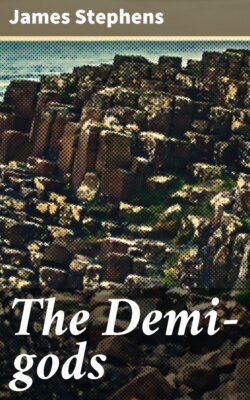Читать книгу The Demi-gods - James Stephens - Страница 6
На сайте Литреса книга снята с продажи.
CHAPTER III
ОглавлениеTable of Contents
The remarkable thing about astonishment is that it can only last for an instant. No person can be surprised for more than that time. You will come to terms with a ghost within two minutes of its appearance, and it had scarcely taken that time for Mac Cann and his daughter to become one with the visitors.
If the surprisor and the surprisee are mutually astonished, then, indeed, there is a tangle out of which anything may emerge, for two explanations are necessary at the one moment, and two explanations can no more hold the same position in time than two bodies can occupy the same lodgment in space.
It needed alone that the angels should proclaim their quality for the situation to arrange itself naturally.
Man is a scientific creature; he labels his ignorance and shelves it: mystery affrights him, it bores him, but when he has given a name to any appearance then mystery flies away, and reality alone remains for his cogitation. Later, perhaps, reality will enrage and mystify him more profoundly than any unexpectedness can do.
The Mac Canns, so far as they professed a religion, were Catholics. Deeper than that they were Irish folk. From their cradles, if ever they had cradles other than a mother's breast and shoulder, they had supped on wonder. They believed as easily as an animal does, for most creatures are forced to credit everything long before they are able to prove anything. We have arranged to label these faculties of imagination and prophecy among the lesser creatures Instinct, and with the label we have thrown overboard more of mystery than we could afford to live with. Later these may confront us again in our proper souls, and the wonder and terror so long overdue will compel our tardy obeisance.
At the end of amazement, as of all else, we go to sleep, and, within an hour of their meeting, the angels and the Mac Canns were stretched in one common unconsciousness.
The angels were asleep, their attitudes proclaimed it. Patsy was asleep, his nose, with the unpleasant emphasis of a cracked trumpet, pealed wheezy confirmation of his slumber. His daughter was asleep, for there by the brazier she lay, motionless as the ground itself.
Perhaps she was not asleep. Perhaps she was lying with her face to the skies, staring through the darkness at the pale, scarce stars, dreaming dreams and seeing visions, while, all around, down the invisible road and across the vanished fields and the hills, night trailed her dusky robes and crushed abroad her poppy.
Whether she had slept or not she was the first to arise in the morning.
A pale twilight was creeping over the earth, and through it one could see chilly trees and shivering grass; the heavy clouds huddled together as though they were seeking warmth on those grisly heights; the birds had not yet left their nests; it was an hour of utter silence and uncomeliness; an hour for blind and despairing creatures to move forward spitefully, cursing themselves and the powers; an hour when imagination has no function, and hope would fly again to the darkness rather than remain in that livid wilderness, for this was not yet the thin child of the dawn, crowned with young buds and active as a wintry leaf; it was the abortion of the dawn, formless, heavy, and detestable.
Moving cautiously in that shade, Mary herself seemed no more than a shadow; she diminished thin and formless as a wraith, while she trod carefully to and fro from the cart to the hedge.
She sat down, unloosed her hair and commenced to brush it.
In this colourless light her hair had no colour, but was of astonishing length and thickness; it flowed about her like a cloak, and as she sat it rolled and crept on the grass. She did not often tend her hair thus. Sometimes she plaited it for the sake of convenience, so that windy days would not whip it into her eyes or lash her cheeks; sometimes, through sheer laziness, she did not even plait it, she rolled it into a great ball and drew a wide, masculine cap over its brightness; and now, before the day had broken, sitting in a ghastly lightness, which was neither light nor darkness, she was attending to her hair.
And this hair perplexed her, for she did not know what to do with it; she did not know whether it was to be seen or not seen; whether to braid it in two great ropes, or roll it carelessly or carefully above her head, or let it hang loosely about her shoulders held only at the nape with a piece of ribbon or stuff. An hesitation such as this was new to her; she had never had occasion for such forethought; it was strange and inquieting; more disturbing, indeed, than the visit at black of night of those tall strangers whose eyes and voices were so quiet, and whose appointments flashed in the firelight while they spoke to her father of the things in which travellers are interested.
She looked at them where they lay, but they were scarcely more than visible—a tangle of flowing cloths and great limbs fading away in the rank grasses and the obscurity, and to her mind the real wonder was not that they had come, but that they were still there, and that they were sleeping deeply and peacefully as she had slept so often, with her head pillowed on her arm and her limbs folded calmly between the earth and the sky.
